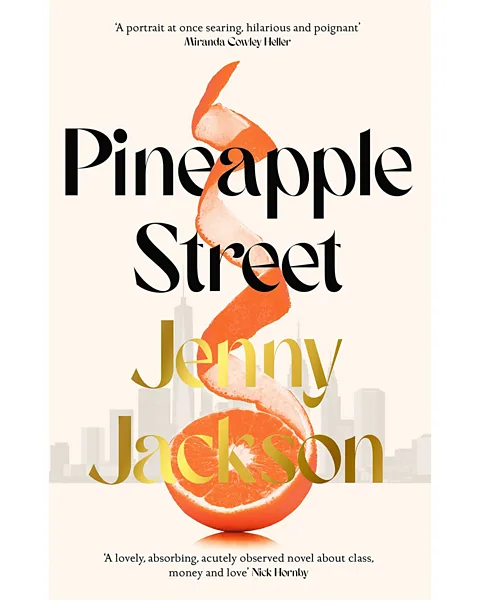From Succession to hit book Pineapple Street – the stories that reveal the lives of the super-rich
 HBO
HBOA new wave of books is getting inside the intriguing inner sanctums of the mega-wealthy. Why do these stories fascinate generation after generation, asks Holly Williams.
The slogan "eat the rich", apocryphally attributed to Jean-Jacques Rousseau during the French Revolution, has seen quite the resurgence in recent years – becoming a rallying hashtag on TikTok and twitter, and used to describe a wave of films and TV shows that gleefully enact revenge on the super-wealthy. Think Succession (reaching its finale this weekend), Parasite, The Menu, Glass Onion, The White Lotus and Triangle of Sadness. To what extent these are firing shots in some new class war is highly debatable, but one thing is for sure: we absolutely eat up content about the rich. In fact, our hunger for such stories seems insatiable.
More like this:
The trend is by no means confined to the screen – interestingly, the Succession scripts have recently been published in book form by literary publisher Faber. And arguably novels are the ur-texts for our obsession with the rich and fabulous. Of course, this is partly because for their first couple of hundred years, most novelists had to be reasonably well-off to afford such a career. There's a reason so many pre-20th-Century "classics" are about the upper echelons of society, and it isn't just that readers find them fascinating.
 HBO
HBOBut it is that, too – something that shows no sign of changing. Consider megahit books, inevitably turned into the glossiest of adaptations, like Crazy Rich Asians or Big Little Lies or even the Fifty Shades trilogy, as much wealth porn as any other kind. Recently, the TikTok-led Dark Academia trend has married elite educational environments and old-money outfits with a gothic vibe, and primarily takes cues from books: key texts include classics like Oscar Wilde's The Picture of Dorian Gray and Donna Tartt's The Secret History, alongside recent #BookTok bestsellers such as The Atlas Six by Olivie Blake or Ninth House by Leigh Bardugo.
Several of 2023's hotly-tipped novels are about the one per cent. A former private tutor to the kids of billionaires, Sarah Thomas takes us inside the world of Russian oligarchs in her debut Queen K, while Ellery Lloyd's new thriller The Club is set at an ultra-exclusive ' club on a private island, and has been picked for Reese Witherspoon's book club. But surely the year's most-hyped novel is Pineapple Street, the brilliant debut by the US editor-turned-author Jenny Jackson that's been dubbed a "delicious new Gilded Age family drama" by Vogue, and optioned for television.
The New York Times best-seller tells the story of the Stocktons, a WASPy family living in Brooklyn Heights, who made their considerable fortune in New York real estate. It walks a razor-fine line between satirising the Stocktons (sample dialogue: "Oh no! I left my Cartier bracelet in Lena's BMW and she's leaving soon for her grandmother's house in Southampton!"), and inviting us to empathise with them. Some readers may bristle at the mere idea of that – but anyone who opens Pineapple Street is likely to be completely absorbed. It's both sharply drawn and comionate, and dangles the possibility that even the mega-rich can have their eyes opened to the moral questions around inherited wealth.
If it seems at odds with recent eat-the-rich content, well, that's deliberate. "We've seen the disgusting-rich-people milieu, and I'm not sure there's a ton of fresh digging to be done there," Jackson tells BBC Culture, speaking from New York via video call. She loves shows like Succession, but felt it was "maybe more interesting to look at people who were trying to be good – or who thought they were good – and who had to reckon with their privilege in different ways".
One major inspiration was an article in The New York Times about trust fund kids giving away their money. Jackson became fascinated by how this reckoning with the injustice of inherited wealth is happening in a much more mainstream way for Millennials and Gen Z than it did for previous generations, who might remain baffled – if not outright hostile – towards such egalitarian leanings.
 Penguin
Penguin"I'm 43, on the edge of Generation X and Millennial, and my attitude has always been: money seems cool, I would really like to have some! Literally that unexamined," Jackson its with breezy candour. "Yet if you were in your 20s right now and had a trust fund, you would probably have complicated feelings about it. So I wanted to write about generational wealth, from generational perspectives."
Jackson's inspiration was also quite literally on her doorstep: living on Pineapple Street in Brooklyn Heights – albeit in a modest flat – she would snoop on more moneyed neighbours. "I was always walking past this apartment with these giant bay windows and a grand piano and those big Chinese urns – like, who lives there">window._taboola = window._taboola || []; _taboola.push({ mode: 'alternating-thumbnails-a', container: 'taboola-below-article', placement: 'Below Article', target_type: 'mix' });
